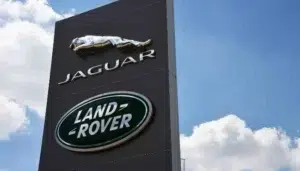Jaguar Land Rover (JLR), the UK-based luxury carmaker owned by Tata Motors, has announced plans to cut up to 500 management-level jobs in Britain.
The decision affects approximately 1.5% of JLR’s UK workforce.
It responds to declining sales, US trade tariffs, and reflects a broader push to streamline leadership under the ongoing ‘Reimagine’ transformation strategy.
Jaguar Land Rover Sales Decline and Tariff Disruption
JLR’s announcement follows a 15.1% drop in retail sales and a 10.7% decline in wholesale volumes for the April–June 2025 quarter.
The company attributed the slump to two key factors:
- Exports to the United States were temporarily paused in April. The disruption was triggered by a sudden hike in tariffs under the Trump administration.
- The phased wind-down of legacy Jaguar models, ahead of a full brand relaunch focused on electric vehicles.
The UK-US trade deal has reduced tariffs from 27.5% to 10% for the first 100,000 UK-manufactured cars exported annually.
However, the tariff disruption had already impacted JLR’s quarterly performance before the deal took effect.
Jaguar Land Rover Voluntary Redundancy Scheme
The job cuts will be implemented through a limited voluntary redundancy programme, targeting managerial roles only.
JLR emphasized that the job cuts align with its normal business practices.
The company routinely offers eligible employees the option to exit through structured redundancy plans.
A company spokesperson stated, “Through this limited UK VR programme for managers, JLR is aligning its leadership workforce for the business’s current and future needs”.
Strategic Realignment Under ‘Reimagine’
The layoffs are part of JLR’s broader ‘Reimagine’ strategy, which aims to:
- Transition Jaguar to an all-electric brand by 2030
- Achieve carbon net-zero across its supply chain, products, and operations by 2039
- Invest £3.5 billion annually in electrification, digital transformation, and sustainability initiatives
Jaguar Land Rover recently halted production of most Jaguar models as part of its brand overhaul.
The company also unveiled a controversial rebrand, featuring a minimalist “J” logo and a pink concept car—drawing criticism from public figures including Elon Musk and Nigel Farage.
Government and Industry Response
The UK government acknowledged the layoffs as “disappointing” but reiterated its commitment to supporting jobs and investment.
Labour MP Preet Kaur Gill highlighted that the new trade deal helped preserve 12,000 jobs at JLR.
She emphasized that the agreement remains crucial to sustaining the company’s future.
Industry experts, including Professor David Bailey of Birmingham Business School, noted that the tariff hike played a “big role” in disrupting JLR’s plans.
The disruption came just as the company was preparing to ramp up electric vehicle production after posting record profits of £2.5 billion in the year ending March 2025.
Note: We are also on WhatsApp, LinkedIn, Google News, and YouTube, to get the latest news updates. Subscribe to our Channels. WhatsApp– Click Here, Google News– Click Here, YouTube – Click Here, and LinkedIn– Click Here.



